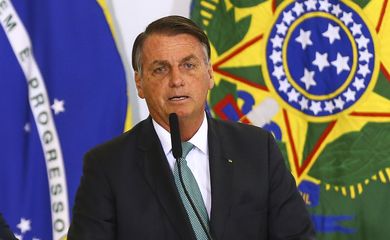Bolsonaro at UN: Brazil wants to attract more private investment

While opening the session of debates of the 76th United Nations (UN) General Assembly today (Sep. 22), Brazilian President Jair Bolsonaro said Brazil is working to attract investment from the private enterprise, adding it has “everything an investor looks for: a large consumer market, excellent assets, a tradition of honoring contracts, and confidence in our government.”

President Bolsonaro further stated that the country is expanding its railway network and conducting other initiatives as part of its program on investment partnerships, further mentioning that the private contracts signed for new railways have surpassed $6 billion. He noted that the government also introduced a new legal framework for the sector in August, simplifying the rules for building new railways.
“In just a few days, we received 14 requests for authorization, for new railways with nearly $15 billion in private investment,” he said. “As a result, [we get] lower consumption of fossil fuels and a reduction in the Brazil cost, especially as food production becomes cheaper,” he went on to say.
Under the Investment Partnership Program—PPI in the original Portuguese—contracts have totaled $100 billion in new investments and grants have reached $23 billion, the president noted. In the coming days, he continued, the government should hold the auction for the implementation of 5G in Brazil.
Paris Agreement
In his address, the president reiterated the commitment made at the Leaders’ Summit on Climate, in April, of reaching total neutrality in greenhouse gas emissions in the country by 2050, anticipating the previous pledge, laid out in the Paris Agreement, by ten years.
At the 26th UN Conference on Climate Change—or COP26—to be held in Glasgow in November, Brazil should seek consensus on the rules governing the globe’s carbon credit market, which is expected to attract further investment into the country. “We hope that industrialized countries effectively meet their commitments with climate financing in relevant amounts. The future of green employment is in Brazil: renewable energy, sustainable agriculture, low-emission industry, basic sanitation, waste treatment, and tourism,” he said.
COVID-19
This edition of the UN General Assembly is being held in a hybrid manner, with statements made both on site and online. President Bolsonaro chose to fly to New York in person.
He expressed grief over the deaths caused by COVID-19 and said that the government will vaccinate “everyone who chooses to be vaccinated in Brazil” by November. The president also opposed the vaccination passport, which requires citizens to be vaccinated to be granted access to services. “We support vaccination, however, our administration has taken a stance against the sanitary passport or any obligation linked to the vaccine,” he said.
Bolsonaro also said that the Brazilian government supports “the autonomy of doctors in search of an early treatment.” “I myself am among those who underwent an early treatment. We respect the ties between doctor and patient in the decision of which medication to be used and its off-label application,” he declared.
“Off-label” refers to a drug used differently from its package insert. Since the beginning of the pandemic last year, the president has advocated the use of medicines like hydroxychloroquine, which has no scientific proof of efficiency against COVID-19, but may be prescribed by doctors if the patient agrees.
“We failed to understand why a number of countries, along with a significant portion of the media, have opposed the early treatment. History and science will certainly hold everyone accountable.”
In his address, the president also underscored the work of Brazilian on the humanitarian field and in the fight against the pandemic, the changes his government has been implementing in the country, and Brazil’s return to the UN Security Council. In the 2022–2023 biennial, Brazil is to occupy a non-permanent seat at the entity.



